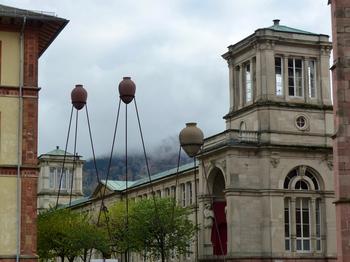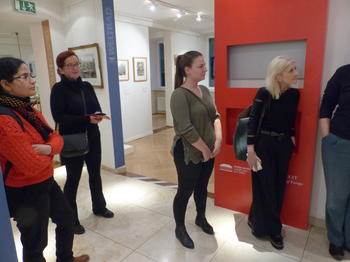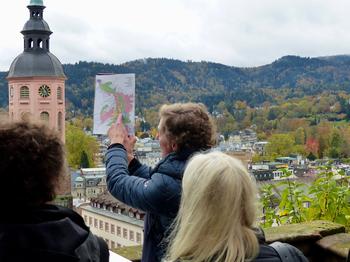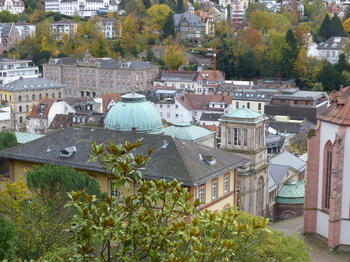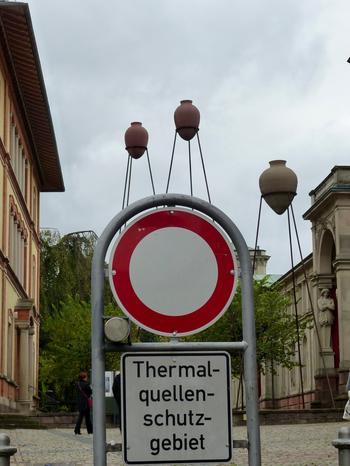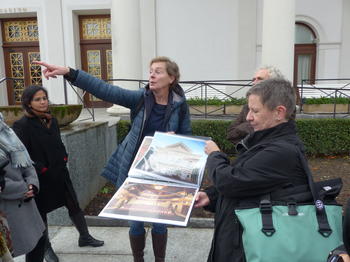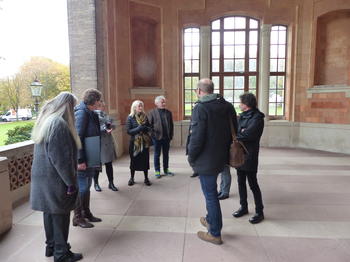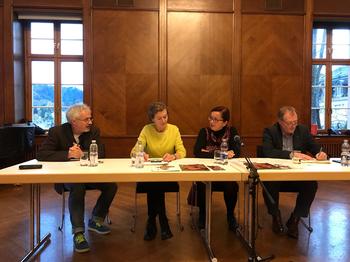Conference report "Spas as Common European Cultural Heritage“, Baden-Baden 2019
Ancient Spa Tradition meets Contemporary Art
Image Credit: The European Spa Project. Henrike Schmidt
Visit of the Baden-Baden Town Museum with Director Heike Kronenwett
Image Credit: The European Spa Project. Henrike Schmidt
Lisa Poetschki explains the geography of a spa town
Image Credit: The European Spa Project. Henrike Schmidt
View of the Source Area from above
Image Credit: The European Spa Project. Henrike Schmidt
Thermal Spring Protection Area
Image Credit: The European Spa Project. Henrike Schmidt
Lisa Poetschki explains the World Heritage Nomination of the City of Baden-Baden
Image Credit: The European Spa Project. Henrike Schmidt
Visit to the Pump Room and Gallery
Image Credit: The European Spa Project. Henrike Schmidt
Panel Discussion "History and Heritage in Spa and Resort Development"
Image Credit: The European Spa Project. Henrike Schmidt
News from Nov 19, 2019
From November 5th to 7th 2019, the members of the international research network "The European Spa as a Transnational Public Space and Social Metaphor" gathered in Baden-Baden to discuss the topic of "Spas as Common European Cultural Heritage". The meeting was hosted by the two local Associated Partners, the Town Museum Baden-Baden and the Department of World Heritage nomination and Urban Design.
The two-day symposium started with explorations on the ground. Heike Kronenwett introduced us to the Town museum and its permanent and temporary exhibitions. We learned how exhibits of the golden age of spa culture and travelling – an elegant historic carriage or a 19th century pharmaceutical travel kit, – can be displayed innovatively among archaeological remains of ancient Roman bathing tradition. We understood that periods of difficult cultural heritage, such as war times for example, are not as easily communicated to the public as the more entertaining aspects of historical spa life with its amazing luxury and entertaining scandals. Heike Kronenwett and Lisa Poetschki then guided us through the contemporary cityscape of Baden-Baden, showcasing how world heritage and the living city today overlap and interact.
Besides from iconic buildings such as the Kurhaus or the Pump room, the historic spa town is characterized by its vast villa areas and, not least, by those parts of the town, where the craftsmen produced the supply for and the souvenirs of the resort as a pleasure place.
Saturated with "empirical" impressions, we plunged into a day of more theoretical explorations with four talks by the project´s Principal Investigators. The lectures led us from the 19th century with its blossoming of spa culture to contemporary challenges, as the often lamentable state of resorts and spa towns for example in the post-socialist countries. We discussed paradigm shifts in spa culture, for example the de-medicalization of the spa-discourse in the early 20th century, as well as recent trends such as "decay photography" and a fascination with decline, which strangely resonates with initiatives for the preservation of cultural heritage. Geographically, we travelled from the German and English seaside resorts to Stalin's spas at the Crimea and the Black Sea, touching upon questions of how spas can be (mis)used for political mobilisation.
In a separate section, the Associated Partners from Croatia (Pula / Brijuni), Germany (Baden-Baden, Bad Wildungen), Poland (Sopot) and the UK (Bath), as well as representative of the European Historic Thermal Town Association EHTTA, displayed their local experiences in promoting their spas as cultural heritage. What problems are contemporary spa and health resorts confronted with when it comes to promoting public health (from cure to wellness)? How can one repurpose a spa heritage in periods of de-medicalization? How can one integrate the local population into these processes? What is best practice? (for example Sopot: collecting memories of local citizens on the museum's website) And what are the dreams and visions? (for example Harrogate: re-opening the historic Pump room as a space for the local population to be able to come together "at the waters")
The academic part of the meeting was open to the interested public, as were the two public events, a reading with Amsterdam based Croatian-language author Dubravka Ugrešić, and a panel discussion with representatives of our Associated Partners from Croatia, Germany and the UK, labelled "Looking for the Future in the Past? History and Heritage in Spa and Resort Development". Although Dubravka Ugrešić had to cancel her participation on short notice, she was able to attend the reading virtually via Skype, talking with the public about the different representations of men and women in spa literature. The eminent topic of the spa love affair, the so-called "Kurschatten", where women tend to be depicted as objects of the male desire, served as a good starting point for this. The panel discussion on the next day offered interesting insights into today's challenges for spa towns. Their transnational nature, with people meeting from all over Europe and increasingly the world, pose challenges with regard to mass-tourism, (lack of) sustainability and climate change. At the same time, precisely because of their inherently cosmopolitan character, spa towns and seaside resorts, can help stem the tide of nationalism – then and now.
The conference was organised as part of the HERA 2.066 project “The European Spa as a Transnational Public Space and Social Metaphor”, bringing together researchers and practitioners from Britain, Croatia, Germany, The Netherlands, Poland and Sweden. The next project conference with researchers (Principal Investigators) and practitioners (Associated Partners) is planned for late summer / autumn in Sopot (Poland).

